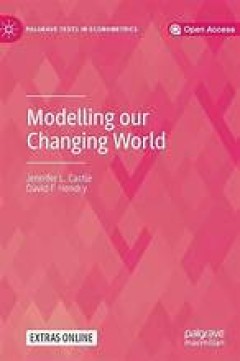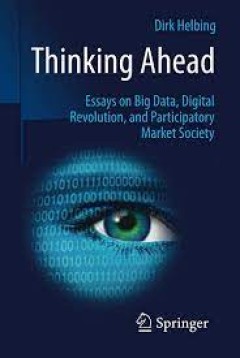Filter by

Modelling our Changing World
This open access book focuses on the concepts, tools and techniques needed to successfully model ever-changing time-series data. It emphasizes the need for general models to account for the complexities of the modern world and how these can be applied to a range of issues facing Earth, from modelling volcanic eruptions, carbon dioxide emissions and global temperatures, to modelling unemployment…
- Edition
- 1
- ISBN/ISSN
- 978-3-030-21432-6
- Collation
- -
- Series Title
- Palgrave Texts in Econometrics
- Call Number
- XIX, 128

Thinking Ahead - Essays on Big Data, Digital Revolution, and Participatory Ma…
The rapidly progressing digital revolution is now touching the foundations of the governance of societal structures. Humans are on the verge of evolving from consumers to prosumers, and old, entrenched theories – in particular sociological and economic ones – are falling prey to these rapid developments. The original assumptions on which they are based are being questioned. Each year we pro…
- Edition
- -
- ISBN/ISSN
- 978-3-319-15078-9
- Collation
- -
- Series Title
- -
- Call Number
- -

The University According to Humboldt History, Policy, and Future Possibilities
This book discusses the philosophy and educational reforms initiated by Wilhelm von Humboldt as well as their legacy in the modern university system. It begins with a discussion of the history of the university from antiquity and the Middle Ages through the era of Humboldt’s reforms and its remnants in and implications for the present day. The authors then delve into policy, outlining the key…
- Edition
- -
- ISBN/ISSN
- 978-3-319-13856-5
- Collation
- -
- Series Title
- -
- Call Number
- -

The Theory of New Classical Macroeconomics A Positive Critique
This book examines new classical macroeconomics from a comparative and critical point of view that confronts the original texts and later comments as a first dimension of comparison. The second dimension appears in a historical context, since none of the new classical doctrines can be analyzed ignoring the parallelism and discrepancies with the theory of Keynes, Friedman or Phelps. Radicalism o…
- Edition
- -
- ISBN/ISSN
- 978-3-319-17578-2
- Collation
- -
- Series Title
- -
- Call Number
- -
 Computer Science, Information & General Works
Computer Science, Information & General Works  Philosophy & Psychology
Philosophy & Psychology  Religion
Religion  Social Sciences
Social Sciences  Language
Language  Pure Science
Pure Science  Applied Sciences
Applied Sciences  Art & Recreation
Art & Recreation  Literature
Literature  History & Geography
History & Geography